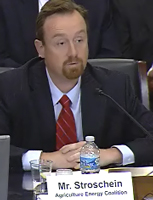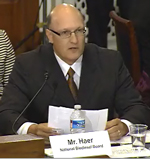The House Agriculture Subcommittee on Conservation, Energy and Forestry was urged to reauthorize Farm Bill energy programs and provide them with mandatory funding during a hearing on “Formulation of the 2012 Farm Bill: Energy and Forestry Programs” on Friday.
 “American agriculture is the key to the successful development and commercialization of clean, abundant, renewable, domestic energy and biobased products in this country, and the ‘core’ Farm Bill energy programs provide American farmers, ranchers and entrepreneurs with the tools they need to make it happen,” testified Ryan Stroschein, co-director of the Agriculture Energy Coalition (AgEC).
“American agriculture is the key to the successful development and commercialization of clean, abundant, renewable, domestic energy and biobased products in this country, and the ‘core’ Farm Bill energy programs provide American farmers, ranchers and entrepreneurs with the tools they need to make it happen,” testified Ryan Stroschein, co-director of the Agriculture Energy Coalition (AgEC).
“Although relatively new, the Farm Bill energy programs already have had a tremendous positive impact on economic and job growth in rural America, and they can do so much more,” said Stroschein. “USDA estimates that the BCAP and Biorefinery Assistance programs alone have the potential to create more than 700,000 new jobs as a result of increased cellulosic feedstock production and the construction and operation of new biorefineries.”
 National Biodiesel Board chairman Gary Haer with the Renewable Energy Group highlighted the biodiesel industry’s growth and diversity, pointing out that more than half of the lawmakers on the panel have at least one biodiesel production plant in their districts.
National Biodiesel Board chairman Gary Haer with the Renewable Energy Group highlighted the biodiesel industry’s growth and diversity, pointing out that more than half of the lawmakers on the panel have at least one biodiesel production plant in their districts.
“NBB estimates that those plants and others like them across the country supported more than 39,000 jobs in all sectors of the U.S. economy in 2011,” Haer testified. “Most of the more than 200 biodiesel production facilities in the U.S. are located in rural areas, and a majority of the feedstock used to produce biodiesel is grown or originates in rural areas.”
Haer specifically called for the committee to continue funding for the Biodiesel Fuel Education Program and the Bioenergy Program for Advanced Biofuels, programs that are critical to raising awareness of biodiesel and stimulating new production. The programs are succeeding, he noted, pointing out that they helped the industry produce a record of nearly 1.1 billion gallons of fuel last year.

